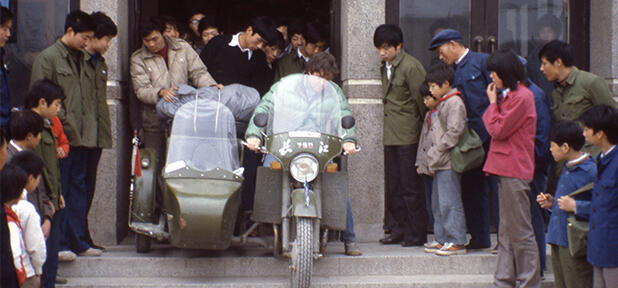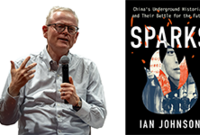English | 中文
The mid-1980s saw a dramatic relaxation of Communist Party control over China’s economic, political, and intellectual life. It was arguably the most liberal period in the history of the People’s Republic, as a new generation of reformers sought to push the country towards a more open and tolerant system. These same trends, however, alarmed Party hardliners, who made repeated attempts to roll back the tide of liberalization.
For members of the American press corps in Beijing, it was a period of testing the boundaries, challenging the restrictions on news coverage at the heart of the system, and exploring parts of Chinese society that had long been off-limits. Assignment China: the 1980s tells their story.
The episode features interviews with some of the leading journalists who covered China during those years, They include John Burns, Edward Gargan and Nicholas Kristof of the New York Times, Michael Weisskopf and Dan Southerland of the Washington Post, Richard Hornik and Jaime FlorCruz of Time, Michael Parks and Jim Mann of the Los Angeles Times, John Sheahan of CBS News, John Pomfret of the AP, Adi Ignatius of the Wall St. Journal, and Dorinda Elliot of Newsweek.
The film breaks important new ground, with John Burns revealing new details about his detention and expulsion from China in 1986, Mike Wallace’s producer sharing the behind-the-story story of the disastrous CBS "60 Minutes" 1986 interview with Deng Xiaoping, which almost got CBS News kicked out of China, the equally interesting story of how Communist Party chief Zhao Ziyang appeared on NBC's "Meet the Press" in 1987, the saga of the reporters who covered the 1987 unrest in Tibet and were booted out of the region for their efforts, and the way journalists reported the remarkable intellectual and political opening in 1988 which paved the way for the pro-democracy demonstrations in 1989.
With rare archival footage and still photos, Assignment China: the 1980s paints a revealing picture of how the media covered the China story in the years leading up to the crisis in Tiananmen Square.
*****
Assignment:China is a signature project of the USC U.S.-China Institute. Most Americans continue to learn about China primarily through the media and we feel that it is vital to understand the process by which news about China is gathered and shared. Mike Chinoy, USCI senior fellow, reports the series which is filmed and edited by Craig Stubing. Clayton Dube conceived of the project and oversees it. Many students and volunteers assist with research, transcription, and translation.
Assignment:China is possible only because of the willingness of journalists and others to share their stories, documents, and images with us and through the generous financial support of individual and institutional donors. We are grateful to all those who have helped. Please click here to contact us or here if you would like to contribute.
- See more at: http://china.usc.edu/assignment-china-tiananmen-square#sthash.0xSt8n9h.dpufThis video is also available on the USCI YouTube Channel.
Interviewees featured in this segment:
Tom Brokaw
Raymond Burghardt
John Burns
Mike Chinoy
Dorina Elliot
Jaime FlorCruz
Edward Gargan
Richard Hornik
Adi Ignatius
Terril Jones
Nicholas Kristoff
Barry Lando
Winston Lord
Jim Mann
Michael Parks
John Pomfret
Scott Savitt
Orville Schell
John Sheahan
Daniel Southerland
Cynde Strand
Michael Weisskopf
Kathy Willhelm
Financial Support:
Jade Chien
Po Chung
The Ted Turner Foundation
Emmet and Jackie Hsu
Stephen Lesser
Michael Malagan
James Thompson
U.S. Department of Education, Public Affairs Section, U.S. Embassy Beijing
USC-UCLA Joint East Asian Studies Center
USC Levan Institute for Humanities and Ethics
Assignment: China is a signature project of the USC U.S.-China Institute. Most Americans continue to learn about China primarily through the media and we feel that it is vital to understand the process by which news about China is gathered and shared. Mike Chinoy, USCI senior fellow, reports the series which is filmed and edited by Craig Stubing. Clayton Dube conceived of the project and oversees it. Many students and volunteers assist with research, transcription, and translation.
Assignment: China is possible only because of the willingness of journalists and others to share their stories, documents, and images with us and through the generous financial support of individual and institutional donors. We are grateful to all those who have helped. Please click here to contact us or here if you would like to contribute.




